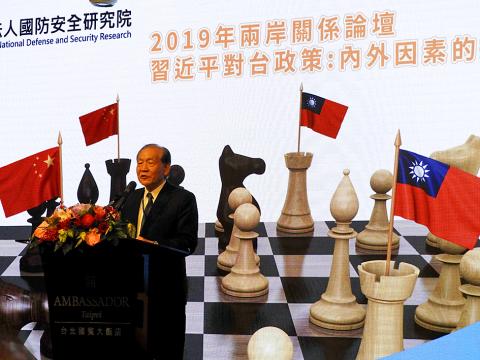China has bolstered its naval forces to assert its claim to disputed islets in the South China Sea, so Taiwan has to focus more on asymmetric warfare to defend against Beijing’s military activities in the region, reports delivered at a cross-strait forum in Taipei yesterday said.
Over the past decade, China has been upgrading and expanding its naval forces, and increased its military activities around disputed islets near Taiwan and the Ryukyu Islands, Institute for National Defense and Security Research (INDSR) deputy executive director Ou Si-fu (歐錫富) said.
“The [Chinese] People’s Liberation Army Navy [PLAN] under Chinese leader Xi Jinping’s (習近平) directives are pushing to control the East China Sea, and to break through from the first island chain to the second island chain, to contest the US dominance in the Pacific Ocean,” Ou said in his presentation to the forum hosted by the institute.

Photo: Chen Yu-fu, Taipei Times
China has promoted its territorial maps with the “nine-dash line” and has built up extensive civilian harbor facilities and military installations on disputed islets and atolls in the Paracel Islands (Xisha Islands, 西沙群島) and Spratly Islands (Nansha Islands, 南沙群島), which are also claimed by several Southeast Asian countries, Ou said.
“Since Xi took power in 2012, he has launched large-scale shipbuilding and weapon modernization programs, [and] allocated larger proportions of China’s national budget for the construction of new warships, and amassing modern weapons and guided missiles,” he said.
PLAN’s strength is close to that of the Russian navy, while the Chinese leadership is seeking to close the gap with the US Navy with the aim of challenging the US for control of Western Pacific, Ou said.
The potential for skirmish exists in the East China Sea, with increased PLAN activities in the areas, and Chinese warships transiting through the Miyako Strait between Taiwan and Okinawa could make it a flashpoint, reports by other military experts said.
Lin Ying-yu (林穎佑), an international relations researcher at National Chung Cheng University, said that Beijing gave the China Coast Guard (CCG) more than 200 patrol cutters, while the China Maritime Militia, a paramilitary force that operates in the South China and the East China seas, has harassed, spied and chased foreign fishing boats away from China-controlled islets.
The PLAN, CCG and Maritime Militia are known as China’s three sea forces, and they have collaborated in military activities to challenge foreign vessels in what they considered to be Chinese waters, while engaging in patrol and surveillance missions, in “low-intensity struggles” to bolster China’s sovereignty claims in contested marine territories, and thereby to advance China’s objectives without engaging in combat. Lin said.
Taiwan’s navy must be prepared for more such encounters, he added.
Due to the increasing gap in military strength, Taiwan needs to focus on asymmetric warfare and portable weapons to deter China’s threat in the surrounding seas and to uphold regional security, several experts said yesterday.
These should include more production or procurement of mobile surface-to-air missiles, vehicle-mounted multiple-rocket launchers, small and medium-scale submarines, stealth missile corvettes, and weapon-carrying drones, they said.

An essay competition jointly organized by a local writing society and a publisher affiliated with the Chinese Communist Party (CCP) might have contravened the Act Governing Relations Between the People of the Taiwan Area and the Mainland Area (臺灣地區與大陸地區人民關係條例), the Mainland Affairs Council (MAC) said on Thursday. “In this case, the partner organization is clearly an agency under the CCP’s Fujian Provincial Committee,” MAC Deputy Minister and spokesperson Liang Wen-chieh (梁文傑) said at a news briefing in Taipei. “It also involves bringing Taiwanese students to China with all-expenses-paid arrangements to attend award ceremonies and camps,” Liang said. Those two “characteristics” are typically sufficient

A magnitude 5.9 earthquake that struck about 33km off the coast of Hualien City was the "main shock" in a series of quakes in the area, with aftershocks expected over the next three days, the Central Weather Administration (CWA) said yesterday. Prior to the magnitude 5.9 quake shaking most of Taiwan at 6:53pm yesterday, six other earthquakes stronger than a magnitude of 4, starting with a magnitude 5.5 quake at 6:09pm, occurred in the area. CWA Seismological Center Director Wu Chien-fu (吳健富) confirmed that the quakes were all part of the same series and that the magnitude 5.5 temblor was

The brilliant blue waters, thick foliage and bucolic atmosphere on this seemingly idyllic archipelago deep in the Pacific Ocean belie the key role it now plays in a titanic geopolitical struggle. Palau is again on the front line as China, and the US and its allies prepare their forces in an intensifying contest for control over the Asia-Pacific region. The democratic nation of just 17,000 people hosts US-controlled airstrips and soon-to-be-completed radar installations that the US military describes as “critical” to monitoring vast swathes of water and airspace. It is also a key piece of the second island chain, a string of

The Central Weather Administration has issued a heat alert for southeastern Taiwan, warning of temperatures as high as 36°C today, while alerting some coastal areas of strong winds later in the day. Kaohsiung’s Neimen District (內門) and Pingtung County’s Neipu Township (內埔) are under an orange heat alert, which warns of temperatures as high as 36°C for three consecutive days, the CWA said, citing southwest winds. The heat would also extend to Tainan’s Nansi (楠西) and Yujing (玉井) districts, as well as Pingtung’s Gaoshu (高樹), Yanpu (鹽埔) and Majia (瑪家) townships, it said, forecasting highs of up to 36°C in those areas